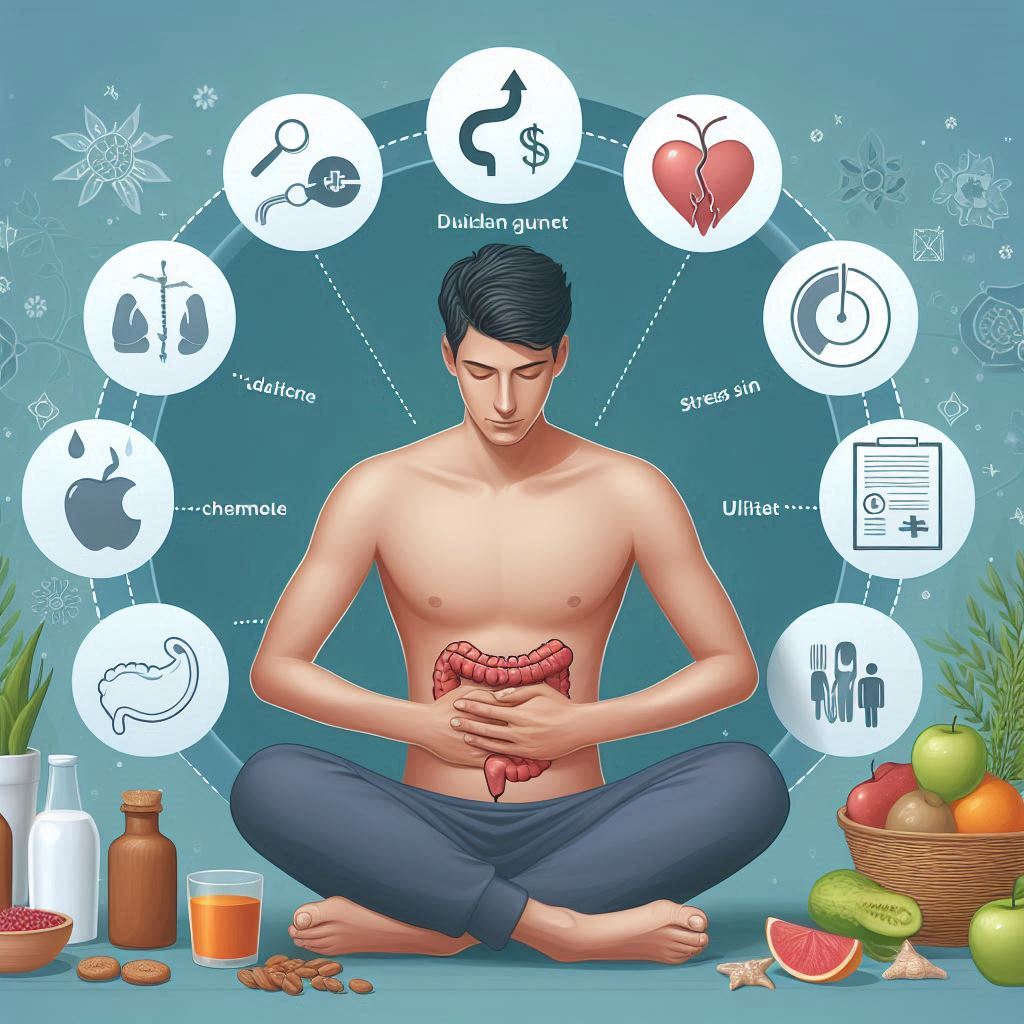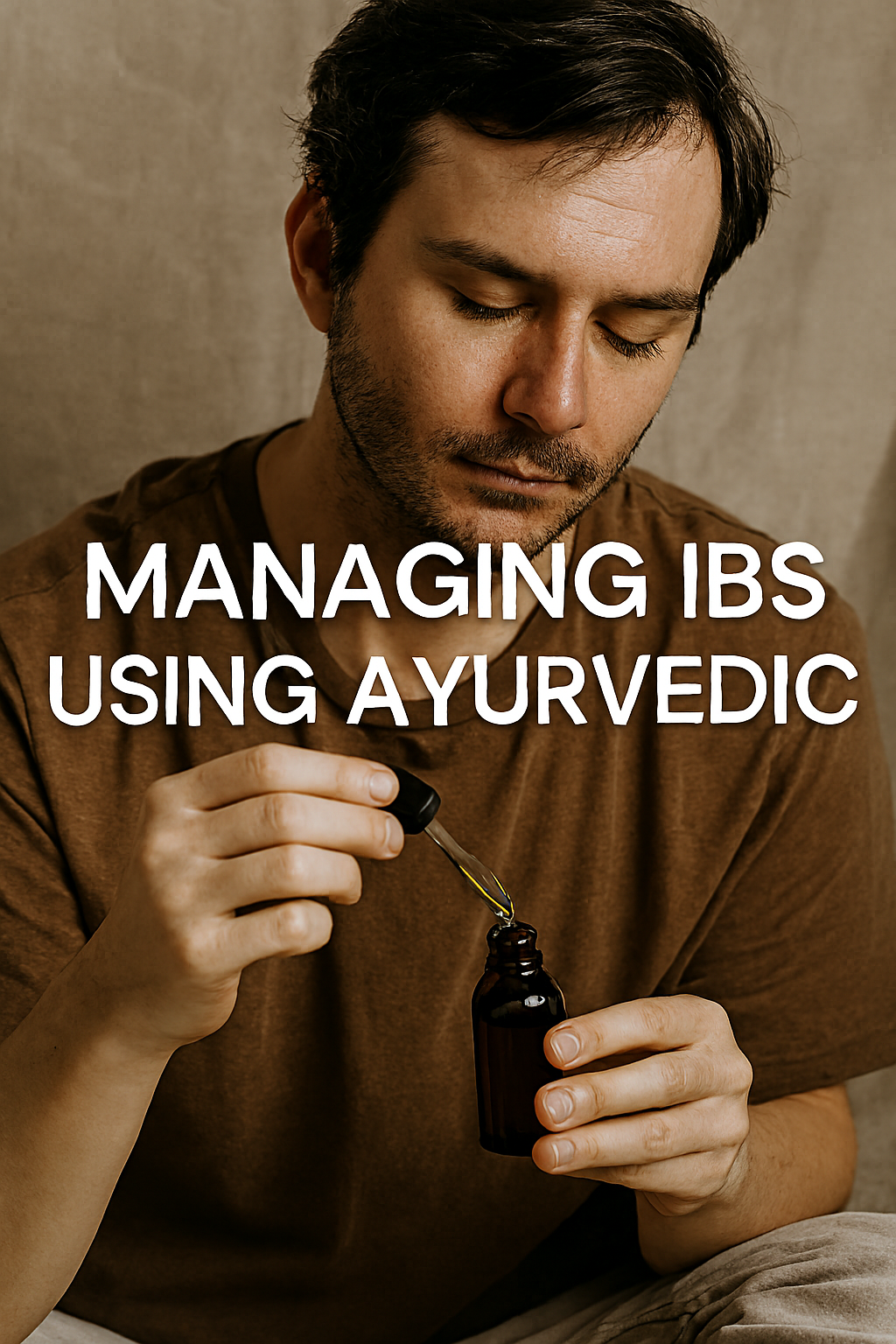Ulcerative colitis (UC) is a persistent inflammatory bowel disease that causes inflammation in the colon, leading to symptoms such as abdominal pain, diarrhea, blood in stools, and fatigue. Among these, abdominal discomfort is one of the most challenging symptoms, often intensifying during flare-ups.
Managing this pain involves more than just medication—it requires a combination of holistic practices, dietary awareness, lifestyle modifications, and natural remedies. This guide explores practical and Ayurvedic methods to ease and prevent abdominal pain in UC patients.
1. Manage Stress to Prevent Ulcerative Colitis Flare-Ups and Abdominal Pain
a. Understand the Link Between Stress and UC:
Stress can significantly worsen ulcerative colitis by disrupting immune function and triggering inflammation. Emotional strain often leads to increased abdominal discomfort and more frequent flare-ups.
b. Practice Relaxation Techniques:
Engage in calming practices such as deep breathing, meditation, and mindfulness to reduce stress levels. Spending time in nature, reading, or doing hobbies can also help promote inner calm.
c. Ensure Quality Sleep:
A lack of restful sleep can increase pain sensitivity and reduce immune resilience. Aim for 6–8 hours of sleep each night to support healing.
d. Avoid High-Stress Situations:
Identify and limit your exposure to stressful environments. Consider therapy, time management strategies, or support groups to build resilience and emotional balance.
2. Follow a Gut-Friendly Diet to Relieve Abdominal Pain in Ulcerative Colitis
a. Cut Down on Processed Foods:
Refined sugars, salty snacks, and processed foods can fuel inflammation. Choose whole, natural foods to support gut health.
b. Eliminate Common Irritants:
Many UC patients experience symptoms when consuming lactose, gluten, or insoluble fiber. Pay attention to food sensitivities and eliminate known triggers like dairy and wheat.
c. Include Easy-to-Digest Foods:
Incorporate low-fat, low-fiber, and soft foods that are gentle on the digestive system—such as bananas, oats, boiled carrots, rice, and lean proteins.
d. Consider Psyllium Husk:
Soluble fiber like psyllium husk may help regulate bowel movements and reduce discomfort—if tolerated. Always consult your healthcare provider first.
3. Use Physical Activity to Support Digestive Health and Reduce UC Pain
a. Choose Low-Impact Workouts:
Light exercise like walking, stretching, or swimming helps improve digestion and reduce inflammation without putting stress on the body.
b. Practice Yoga for Digestion:
Yoga poses such as Child’s Pose and Reclining Bound Angle Pose help massage the abdominal area and promote bowel relaxation.
c. Avoid Intense Physical Strain:
Heavy exercise can trigger flare-ups. Stick with soothing, restorative movement that supports healing.
4. Stay Hydrated to Control Ulcerative Colitis and Prevent Cramps
a. Watch Fluid Loss During Diarrhea:
Frequent loose stools can lead to dehydration and muscle cramping. Increase your fluid intake, especially during flare-ups.
b. Sip Water Consistently:
Drink at least 8 glasses of water daily. Hydration supports digestion, reduces cramping, and helps flush out toxins.
c. Use Electrolyte Drinks if Needed:
When dehydration is severe, rehydrate with electrolyte-rich fluids containing potassium, sodium, and magnesium to reduce muscle spasms and fatigue.
5. Use Ayurvedic & Herbal Remedies
a. Try Natural Anti-Inflammatories:
Herbs like turmeric (with curcumin) and boswellia (Shallaki) help reduce inflammation in the colon naturally.
b. Arjuna for Intestinal Healing:
Terminalia arjuna is beneficial in managing bleeding and healing the mucosal lining of the intestines.
c. Kutaz for Diarrhea Relief:
Holarrhena antidysenterica (Kutaz) is traditionally used to control diarrhea and dysentery symptoms in UC.
d. Always Consult Before Starting Herbs:
Herbs can support healing, but they should be used alongside medical treatments and under professional supervision.
6. Use Medicines Wisely
a. Stick to Your Prescription Plan:
Anti-inflammatory medications, corticosteroids, and immunosuppressants are often required to manage UC. Use them exactly as directed.
b. Limit Steroid Use:
Steroids are effective short-term but come with side effects. Avoid long-term use by supporting your health with lifestyle and dietary changes.
c. Explore Probiotics & Supplements:
Probiotics can help restore gut flora. Vitamin D and omega-3 supplements may also help manage inflammation—but always consult your doctor first.
7. Have Regular Health Checkups
a. Track Your Progress:
Regular check-ins with your gastroenterologist help identify complications early and ensure your treatment remains effective.
b. Adjust Treatment Based on Symptoms:
Ulcerative colitis symptoms can change over time. Staying in touch with your doctor ensures timely updates to your treatment plan.
Preventing abdominal pain in ulcerative colitis involves a combination of medical care, stress reduction, dietary changes, hydration, and natural remedies. With the right approach and ongoing support, individuals with UC can live more comfortably and reduce the frequency and intensity of flare-ups.




